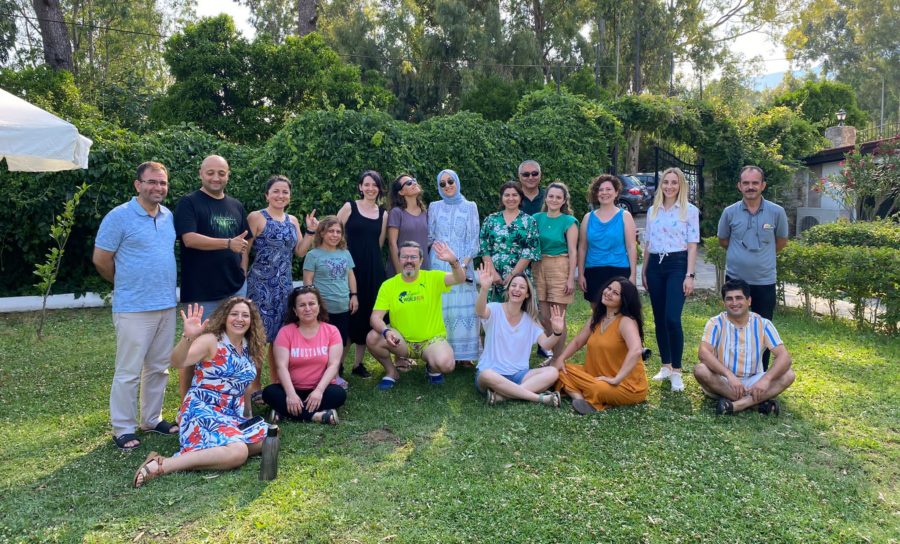
[vc_row][vc_column][vc_column_text]Rural Schools Transformation Network (Köy Okulları Değişim Ağı-KODA) received a grant from our Donor Advised Fund for its project “Rural Teachers Hand in Hand Program” which aimed to empower newly graduated rural teachers personally and professionally through one-to-one mentoring by experienced rural teachers and to facilitate their adaptation to the school and village environment.
Read below our interview:
The second year of face-to-face education, which resumed after the COVID-19 pandemic, has recently started. Considering the feedback you received from teachers and parents, how has this year been for rural schools? Can you tell us about the emerging and changing needs of teachers and schools?
Rural schools have experienced various difficulties in this process due to their limited resources. Switching to online education was challenging for both children, their families and teachers. For this reason, as KODA, we have worked to meet the educational needs of teachers and parents so that rural children can also have a quality education.
With our programmes this year, we have reached candidate teachers, experienced teachers, and teachers at the beginning of their careers. In addition, we also worked with parents to strengthen the support mechanism around children. The Rural Teachers Hand in Hand Programme, which we implemented with the grant support of the Donor-Advised Fund, is a mentoring programme where we reach out to both experienced and newly appointed teachers.
With our programmes this year, we have reached candidate teachers, experienced teachers, and teachers at the beginning of their careers.
You have recently completed the project Rural Teachers Hand in Hand Programme that you implemented with our grant support. Can you tell us about the project and its activities?
It is a programme where mentoring is offered by experienced primary school teachers to teachers who are in the first three years of their profession. We first formed a team of 40 primary school teachers with at least seven years of professional experience. While forming this group, we selected teachers who were highly motivated to share their experiences and who had developed themselves professionally in various fields for years.
Then, our experienced teachers received online mentoring training from KODA’s trainers and became KODA’s volunteer mentor teachers. With this training, they acquired practical mentoring skills in the areas of communication and leadership.
Each mentor teacher was matched with two mentees. The mentoring activities were carried out through online meetings once every three weeks, resulting in a total of six meetings. At these meetings, subjects such as classroom management, teaching in multigrade classes, and communication with families, which teachers at the beginning of their careers need the most support, were discussed.
In the second term, new mentees joined our programme. In both semesters, the participant teachers were supported with online trainings. For instance, we offered a 6-hour online pedagogy training for our mentors. In this way, our experienced teachers had the opportunity to improve their professional skills and share their learnings with newly appointed teachers.
Newly graduated teachers shared that they felt less lonely and that they were better able to implement educational models suitable for the working conditions in the village.
You prepared a Monitoring and Evaluation Report to show the impact of this project. Considering the findings of the report and the feedback you received, how do you think the project contributed to the mentees’ personal lives and professional skills?
According to the data we obtained during monitoring and evaluation, newly graduated teachers who participated in the project shared that they felt less lonely and that they were better able to implement educational models suitable for the working conditions in the village.
The professional motivation of our experienced mentors increased, and their professional skills and personal awareness improved through the trainings they received. As KODA, we were happy to see such results.
How has the grant support contributed to your association and your work? Why do you think the efforts for paving the way for a better rural education must be supported by different donors?
The Rural Teachers Hand in Hand Programme is a long-term online programme, which means that the participant teachers allocate a lot of time and effort within their busy schedules. Because of this, the sense of belonging that teachers feel to the project and KODA is truly valuable.
We met with the mentor teachers in a one-week summer camp in the Orhaneli district of Bursa, where the teachers had the opportunity to consolidate their theoretical and practical knowledge. They also got to know our association, team and all other programme participants better. For this reason, we would like to thank you for your support and interest in our work. Supporting such activities is crucial for us to achieve our goals and the sustainability of our work.
The professional motivation of our experienced mentors increased, and their professional skills and personal awareness improved through the trainings they received.
Can you tell us about KODA’s priorities and planned activities in the coming period?
As KODA, we primarily aim to expand our existing programmes. In addition, we launched our social and emotional learning programme for the first time this year. With this programme, we aim to improve the social skills of children and young people in rural areas such as self-confidence, communication and making sense of their emotions. As KODA, we will continue our training programmes for children living in rural areas, their teachers and their families.
About KODA
KODA works to improve the quality of rural education in Turkey by providing support to teachers and students. KODA carries out activities to implement an innovative understanding of education that will spread from the child to the whole community and support rural development.[/vc_column_text][/vc_column][/vc_row]



